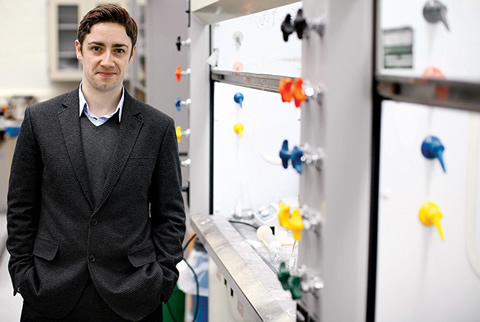Patrick Gunning rattles off the names of lab equipment like some people might itemize tools in their garage, except it’s unlikely that any among us own Surface Plasmon Resonance systems. This is just one of the high-tech instruments that the U of T Mississauga chemistry and physical sciences professor will purchase to outfit a new Centre for Cancer Stem Cell Therapeutics, based at UTM.
This past spring, Gunning was awarded $5.9 million for equipment and expanded lab space from the Canada Foundation for Innovation, the Ontario Research Fund and UTM. At the centre, Gunning will lead a team of researchers who are developing drugs to treat some of the deadliest cancers, such as leukemia (blood cancer) and glioblastoma (brain cancer), which are thought to originate from cancer stem cells.
And the Surface Plasmon Resonance system? “Through this instrument,” says Gunning, “we can identify molecules that are going to bind to specific proteins within cells – with a view to eventually developing drugs from these molecules that kill cancer cells but not healthy cells – and we can do it more rapidly, at least 10 times faster. Where we were able to test just two molecules in a day, now we will be able to screen 20.”
Along with chemistry-related equipment, the centre will purchase microscopes, computers and nuclear magnetic resonance
spectroscopes. Working under the same roof will be experts in medicinal chemistry, computational and molecular biology, stem-cell biology and clinical oncology, who will take a multipronged approach to the cancer puzzle.
By pooling the resources of all these researchers, the centre will have access to an unprecedented number of primary brain tumor samples to be used to test drug efficacy in the lab, without human subjects. They also plan to identify potential new drugs through data analysis, and to examine how proteins interact with the drugs with the aim of tailoring treatments according to the particular type of cancer. Overall, Gunning and his associates hope to develop drug therapies for at least four different conditions including two types of leukemia (acute myeloid leukemia and chronic myeloid leukemia) and brain cancer.
Additionally the centre’s researchers actively plan to court investors and launch spin-off companies. They also aim to establish partnerships with other academic institutions, hospitals and foundations.
Gunning’s bustling lab already employs nearly 30 people. With the launch of the centre he plans to add at least another 10 positions, including technicians, postdocs and four graduate students as well as some undergraduates.
“The personnel working in my lab help with design, chemistry, biophysical evaluation and cell biology to identify compounds that are suitable for preclinical trials,” says Gunning. “They are going to be involved in every aspect of the drug discovery panoply.”
Patrick Gunning talks about his cancer research






No Responses to “ New Centre to Fight Cancer ”
I am very interested in Prof. Gunning's work on brain cancer cells. As a neurosurgeon, I treat children in Ireland with a variety of brain tumours, having worked in Toronto with Michael Taylor and Peter Dirks. I’d be interested to hear how Prof. Gunning's work ties in with work on medulloblastoma under way at Sick Kids. It’s an area we still struggle with despite recent molecular advances in our understanding of what makes these tumours more or less responsive to therapy.